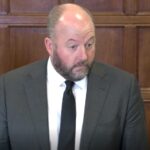The Department for Education (DfE) have announced the arts organisations that will lead Music Hubs across England from September 2024.
41 of the 43 regions set up in the Music Hubs Investment Programme were confirmed by the DfE and Arts Council England (ACE) earlier this month.
The new hubs will share £79m pounds between them for the 2024-25 academic year. But according to ACE data, funding for music education has risen by just 1% since 2012.
As part of the reshuffle, the government will also invest an additional £25 million in instruments, equipment and technology.
The changes reduce the amount of hubs across England from 116 to 43, as part of the Music Hub Investment Programme. It was set up by the DfE and ACE in the latest National Plan for Music Education in 2022.
Music Hubs were initially set up to improve the consistency of teaching across England in the first National Plan for Music Education 13 years ago. They’re made up of different organisations, including local authorities, schools, and community groups, that work together to teach music in a certain area both in and out of school.
The chief executive of ACE, Darren Henley, has said the new hubs “will support the brilliant work of our dedicated music teachers across the country, and help bring high-quality music education to even more children and young people in every part of England.”
Industry response
But organisations who work alongside music educators are worried about the upcoming changes.
The Musicians’ Union (MU) says existing government policy creates issues in implementing the changes. They told City News the National Plan for Music Education is not statutory, which means schools don’t need to collaborate with hubs.
Their National Organiser for Education and Health and Wellbeing, Chris Walters, says:
“We’ve got funding issues, we’ve got the issue of it being non-statutory so there’s no accountability and no follow up, and then we’ve also got clash with other education policies.
“So, if you look at the policies that this government have been pursuing for the last decade and more, we’re seeing a move away from Arts subjects in schools and towards so-called core subjects.
“You have to ask how does the national plan dovetail in with that? And there is no answer.”
Research by the MU found that Music Hub funding has dropped by around 30% from 2010 to 2023. They say Music Hubs are raising fees to balance these shortages, which have to be picked up by parents.
The MU have raised their concerns to the DfE through open letters with the Independent Society of Musicians (ISM) and Music Marks; two other organisations that champion the work of music educators.
The ISM is the largest non-union body for musicians in the UK, and is financially independent. Their Head of External Affairs, Colin Stuart, says there’s no evidence that reducing the number of hubs will improve music education.
“These Hubs have been in place for over 10 years, so they’re established in their communities, and have been doing overwhelmingly celebrated work.
“And this whole process, which has been done by the Arts Council and the DfE, sort of together, it’s never entirely sure who’s responsible for which bit.
“It’s been shrouded in secrecy, it’s been overly burdensome and just the lack of transparency has just led us to say actually, we do need to have a pause, to have a look at what’s actually going on here, and whether this is actually going to benefit children’s music education.”
Other music education industry leaders have reacted to the DfE and ACE’s announcement of new hubs over the past week. On X, formerly known as Twitter, Roz De Vile, the CEO of Music Masters, says the reshuffle is not a boost.
I usually keep quiet about these things, but when my mum sent me this link and said ‘good news for music ed!’ enough is enough. There is no ‘boost’. It’s a damaging message that undermines our sector’s desperate financial need and funding crisis. Grrr. https://t.co/PK4DNIS8NI
— Roz De Vile (@RozDeVile) May 10, 2024
Music Hubs and the process
Music Hubs had to submit an application to become a Hub Lead Organisation (HLO) by October 2023. ACE told City News they assessed all applications using the criteria available publicly on their website.
Tamsin Lodder is the Service Manager at Bedford Music Hub. She told City News that they’re looking forward to working with neighbouring hubs, as it’s something they already do.
“The past few years, we’ve worked really closely together, we’re really pleased that we’ve been put together. It felt like it’s giving us opportunities to develop that further.”
She also said that despite good communication from ACE, they weren’t told exactly why they changes were happening.
“I think that’s been the difficultly of the process, the lack of transparency.
It’s difficult to know what’s driving the agenda, actually, I think that’s a problem.”
Since City News spoke to Tamsin, Bedford Music Hub found out their application to become an HLO was unsuccessful. Another hub will lead music education in the region.
How do music teachers feel?
The teachers supported by charities and unions like the MU and ISM told City News they notice the disparity in music education quality between regions across England.
Saxophonist Lydia Kenny is a peripatetic teacher, and professional musician. She’s been a music teacher for over five years. Lydia recently moved to London, and now teaches in a state school multi-academy trust. She says she’s noticed a big difference in standard.
“In Gloucestershire, students who are in the Music Hubs tend to be students at either private schools or grammar schools, where there is a lot of music provision in the school as well so when they come to the Hub they make the overall standard really quite high.
“I’m also a very keen advocate for teaching in comprehensive schools, and the difference, is not enthusiasm or professionalism of the students, but it’s level, because of the different backgrounds or different opportunities they’ve been given.
“The difference, is not enthusiasm or professionalism of the students, but it’s level.”
Dr Steven Berryman works in a multi-academy trust. He’s also president of the Chartered College of Teaching, the professional body for teachers, and is looking forward to the changes.
“There’s great work happening but it’s all jumbled up with a very complicated ecology of qualification decline, GCSEs particularly and A Levels in Music.
“That affecting reducing numbers at university, we know higher education’s closing music departments.
“So, it’s quite difficult to inspire young people to progress with music when they might not have anywhere to go.”
He told City News he’s hopeful the reshuffle will balance access to music education across England and inspire children.
What next?
The DfE’s acknowledged that a lot has changed in the last decade. Along with ACE, they think reshuffling Music Hubs will level the quality of music education throughout England.
ACE told City News that larger regions will improve the collaboration and consistency of music education and they’re looking forward to seeing the impact of the programme.
Two regions are still leaderless ahead of next academic year. ACE have invited applications from organisations in South West London and South Yorkshire to apply by 6 June. They say they will let organisations know the outcome of their application by July, so they are prepared ahead of September.






